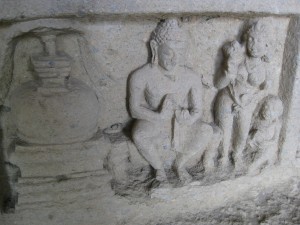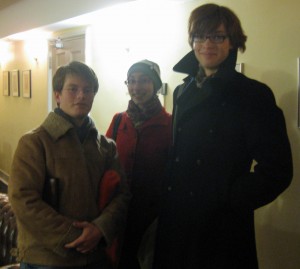 The Buddha “went forth from home to homelessness,” leaving his family behind as he followed his sense that he needed to learn something more, something that could only be found by launching out on his own. Their love for young Siddhattha Gotama led his family to desire that he stay: they loved who he already was and they could rightly recognize the fulfillment that would come to him and to them by his staying in the family home. Yet if their love for him had been true, it would not have been a matter simply of loving what he already was, but would equally be a love for who he aspired to be, and such a love would welcome his embarking on his quest. This ambivalence—simultaneously desiring the maintenance of the happy situation that already is and desiring the transformation of that situation on behalf of what could be—this ambivalence is surely what is commonly felt by parents as they teenage children depart for university.
The Buddha “went forth from home to homelessness,” leaving his family behind as he followed his sense that he needed to learn something more, something that could only be found by launching out on his own. Their love for young Siddhattha Gotama led his family to desire that he stay: they loved who he already was and they could rightly recognize the fulfillment that would come to him and to them by his staying in the family home. Yet if their love for him had been true, it would not have been a matter simply of loving what he already was, but would equally be a love for who he aspired to be, and such a love would welcome his embarking on his quest. This ambivalence—simultaneously desiring the maintenance of the happy situation that already is and desiring the transformation of that situation on behalf of what could be—this ambivalence is surely what is commonly felt by parents as they teenage children depart for university.
True loyalty to another requires loving the possibilities of that other, and not just what is currently actual, and loving that possibility may indeed mean—as it does in the case of the parents whose daughter or son is leaving home—accepting a future in which one is not involved. When a daughter announces her desire to become an artist or a son announces his desire to marry, parents must accept that the children will follow a path not of the parents’ design. Love requires that, for the sake of the other’s future, one embrace being denied.
True loyalty requires a willingness to accept denial. Equally, loyalty to another can require that one deny that other. It is loyalty to the future possibilities of a student that leads a teacher to criticize that student’s work or behaviour. While it would be comfortable—to both student and teacher—simply to accept the student’s limited skills of communication or distorted grasp of the subject matter, the good teacher will nonetheless embrace the uncomfortable situation—uncomfortable to both student and teacher—and criticize the student’s work, denying that the current situation is satisfactory. To do otherwise would be to sacrifice the student’s future, to fail to prepare the student to live up to the norms to which she will ultimately be accountable.
 In both of the situations described here—the departure of children and the criticism of students—the responsibilities of loyalty are reciprocal. Parents need to allow their children to leave, and children need to leave their parents. And, just as the good teacher must express loyalty through criticism and denial, so must the good student be prepared to receive such criticism and denial as an expression of support.
In both of the situations described here—the departure of children and the criticism of students—the responsibilities of loyalty are reciprocal. Parents need to allow their children to leave, and children need to leave their parents. And, just as the good teacher must express loyalty through criticism and denial, so must the good student be prepared to receive such criticism and denial as an expression of support.
We often think of love and loyalty as simply matters of affirmation—“unconditional acceptance.” Such an undiscriminating approval, however, is fundamentally a denial of our “temporality,” a denial, that is, of the fact that our present is always opening onto a future to which it is answerable.
Inasmuch as love and loyalty involve denial, criticism, and, hence, opposition, however, they are inherently marked by discomfort and strife. To be in a loving situation will necessarily be to make oneself vulnerable to being critically appraised—one of the most intimately challenging and uncomfortable experiences known to mankind! To be in a loving situation is also to make oneself responsible to be critical—a responsibility to be undertaken lovingly and carefully, one of the most difficult requirements known to mankind! How often, I wonder, do lovers abandon the real vibrancy and dynamism of their love because of the challenges of this true loyalty.
Socrates, the philosopher who liked to spend his days wandering in downtown Athens chatting with people, unrelentingly practiced such a loving discourse. He approached others always with the sense that the way to respect a person as such is to treat her or him as “accountable,” and so he imagined that healthy interactions would always involve mutual appraisal—criticizing and being criticized (which can involve endorsement, as well as denial). No doubt he sometimes let himself be overtaken by the “enthusiasm” of critique, and failed to be sufficiently careful or loving in his challenges; no doubt he sometimes fell for the flattery of approval and was overly sensitive to being appraised negatively. Nonetheless, his life evinces a sincere and consistent commitment to treating human lives as things of value, as things worthy of being held answerable to the highest standards. His trial and execution in 399 BC is perhaps evidence for how hard we find it to embrace truly the demands of loyalty.


 Participants in these
seminars consistently have the experience of growth in their conversation and
conceptual abilities, and typically leave with a transformed sense of the nature
and possibilities of philosophy.
Participants in these
seminars consistently have the experience of growth in their conversation and
conceptual abilities, and typically leave with a transformed sense of the nature
and possibilities of philosophy.





One Comment
There is a very pleasant form-content identity going on here. I was struck how the action of the piece seems to take place between Buddha and Socrates. Not only because these were times and lands long lost amidst which to locate ourselves, but because those signal events or terms were handled with an unhistoricism so extreme (‘it’s like sending off kids to university’, ‘it’s like hanging around downtown Athens’) as to make a Leo Strauss blush. The piece closes with a very formal reminder of dates, not just any old ones but as solemn and final a one as there ever was. If these were formal marks, what about the content? “Fundamentally,” the issue through this or that inter-act of inter-subjectivity, this loyalty or that critique, is about denying (or not) our temporality. About the need to think outside given dates and historicist constructions and perhaps even into some Jamesonian postmodern “electro shock therapy” of messing with placid time categories to some authentic, hypercritical ends. (*Air guitar squeals!*)